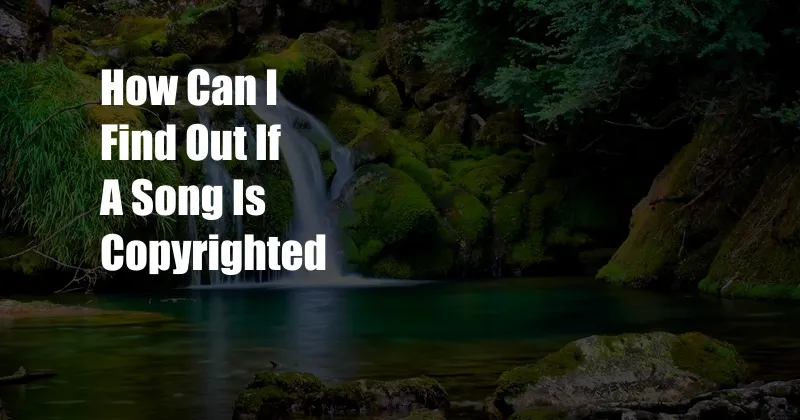
How to Determine if a Song is Copyrighted
Do you often wonder whether a song you like is copyrighted? Understanding copyright laws is crucial in today’s digital age, especially if you wish to use music in your creative projects. This comprehensive guide will provide you with all the information you need to determine if a song is copyrighted and how to proceed accordingly.
Copyright Law and Music
Copyright law safeguards the exclusive rights of creators over their original works, including musical compositions. It covers both the musical composition (melody, harmony, and lyrics) and the sound recording (the specific performance of the song). Copyright lasts for the lifetime of the creator plus an additional 70 years after their death.
There are exceptions to copyright laws, such as fair use, which allows limited use of copyrighted material for purposes like criticism, education, or parody. However, it’s important to use copyrighted music responsibly and avoid infringement.
Identifying Copyrighted Songs
1. Check for the Copyright Symbol or Notice:
Most copyrighted songs will include a copyright notice, which typically appears in the form of the copyright symbol (©) followed by the year of publication and the name of the copyright holder. This notice can be found on album covers, song lyrics sheets, or online music platforms.
2. Search Copyright Databases:
Several copyright databases exist, such as the United States Copyright Office and the Library of Congress. You can search these databases using the song title, artist name, or other identifying information to see if the song is registered with copyright.
3. Consult Publishers or Performing Rights Organizations:
The song’s publisher or a performing rights organization (PRO) such as ASCAP, BMI, or SESAC may also have information about copyright ownership. Contact them with the song title and artist name to inquire about copyright status.
Determining Copyright Ownership
4. Consider the Source:
If you obtained the song from an official source, such as a record label or authorized music streaming service, it’s likely that the song is copyrighted. Conversely, if you downloaded it from a questionable website or received it from a friend, there’s a higher chance that it may not be copyrighted.
5. Research the Artist or Composer:
Researching the artist or composer can provide clues about copyright ownership. Their official websites, social media profiles, or interviews may mention their copyright policies or credit the original creators of the song.
Tips for Using Copyrighted Music
6. Obtain Permission:
The safest way to use copyrighted music is to obtain explicit permission from the copyright holder. Contact the publisher, performing rights organization, or the artist directly to request a license for use.
7. Use Royalty-Free Music:
Many websites and services offer royalty-free music that you can use without paying royalties or seeking explicit permission. Be sure to read the terms and conditions carefully to ensure that the music can be used for your intended purpose.
8. Give Proper Credit:
Even if you use royalty-free music, it’s important to give proper credit to the original creators. This can be done by including the song title, artist name, and copyright notice in your project.
Frequently Asked Questions
Q: Can I use a copyrighted song in a personal video or music mix?
A: Using copyrighted music in personal projects without permission is generally considered an infringement. However, fair use principles may allow limited use for non-commercial purposes, such as using a small portion of a song for a student film or a private party.
Q: How can I avoid copyright infringement when using music?
A: Obtain permission from the copyright holder, use royalty-free music, give proper credit, and limit your use to fair use principles.
Conclusion
Determining if a song is copyrighted requires careful consideration of various factors, from copyright notices to research. By following the steps outlined in this guide, you can navigate copyright laws confidently and avoid infringement.
If you’re interested in using copyrighted music, always remember to prioritize ethical practices and give credit where it’s due. By respecting the rights of creators, you can contribute to a thriving creative ecosystem that benefits both artists and users alike.